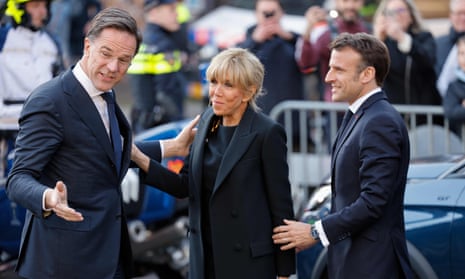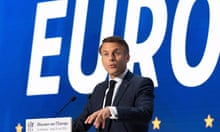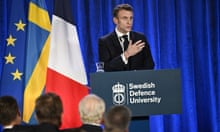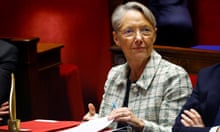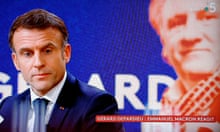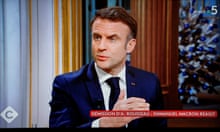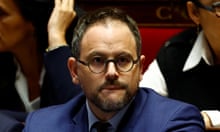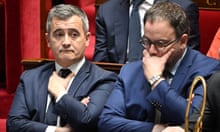Emmanuel Macron has stood by his controversial comments on Taiwan, repeating that being a US ally did not mean being a “vassal”.
At the end of a state visit to the Netherlands during which he has also faced protests over pension reforms at home, Macron appeared to reaffirm the remarks he made in an interview on Sunday, in which he called for Europe to act more independently from the US over Taiwan.
“Being an ally does not mean being a vassal … [or] mean that we don’t have the right to think for ourselves,” Macron told a press conference in Amsterdam with the Dutch prime minister, Mark Rutte.
Macron, who visited China last week, said French and European policy on Taiwan “has not changed” despite the furore over his remarks in which he backed Europe’s strategic autonomy. “France is for the status quo in Taiwan” and a “peaceful resolution to the situation”, he added.
For the second day in a row, Macron was targeted by demonstrators protesting against France’s move to increase the pension age from 62 to 64. Two demonstrators were arrested on Wednesday after running towards him outside Amsterdam University. On Tuesday, hecklers interrupted Macron during a speech on European sovereignty in The Hague.
His comments that Europe must not get involved in US fights, and should aspire to become a third pole alongside Washington and Beijing, were acclaimed by Chinese media, but the reaction within European political circles has been sharply divided.
He gave the interview just as China was undertaking military exercises off the coast of Taiwan in response to a meeting between Taiwan’s president, Tsai Ing-wen, and the US House speaker, Kevin McCarthy, in Los Angeles.
Degrees of unease with Macron’s freelancing also emerged in Berlin, from where Annalena Baerbock, the German foreign minister, flew to Beijing on Wednesday for a long-planned visit that some officials framed as an exercise in damage limitation after the French president’s remarks.
The foreign policy spokesperson for Baerbock’s Social Democrat coalition partners, Nils Schmid, told Der Spiegel she faced “the unplanned challenge of clarifying Europe’s stance on Taiwan and firming up the warnings that the chancellor [Olaf Scholz] sounded during his meeting with Xi [Jinping] in November”.
Andrea Sasse, a spokesperson for the German foreign ministry, accused China of inflaming tensions with its military exercises around Taiwan. “We have the impression that measures such as threatening military gestures … increase the risk of unintended military clashes,” she said. Germany is “working with our international partners to contribute to de-escalation” in the region, she added.
Last August, Baerbock drew angry responses from Beijing when she likened Beijing’s threatening posture towards Taiwan to Russia’s war of aggression in Ukraine.
In his interview, Macron had cautioned against being drawn into a crisis over Taiwan driven by an “American rhythm and a Chinese overreaction”.
His call for greater economic and defence sovereignty for Europe is not in itself new and was criticised only when he coupled the aspiration with a call for Europe to distance itself from the US over Taiwan. He added that Europe “should not be caught up in a disordering of the world and crises that aren’t ours”.
In a sign of French disarray, the country’s foreign ministry cancelled a planned debriefing on the trip for foreign diplomats in Paris on Tuesday as officials scrambled to make sure they had a consistent message and to limit any fallout with Washington.
US Republican senators have already responded by calling for the US to rein in its support for Ukraine if Europe is not prepared to back the US over China. The Republican senator Marco Rubio said: “If France won’t pick sides over Taiwan, maybe the US shouldn’t pick sides on Ukraine and leave it to Europe.”
The former US president, Donald Trump, accused Macron, who he said was a friend, of “kissing Beijing’s ass”.
The German leader of the European Peoples party in the European parliament, Manfred Weber, also criticised Macron: “There is no middle ground between international law and the pursuit of empire by autocrats. To protect our freedom, democrats must stand together in defence of a rules-based world, in Ukraine and in Taiwan. We have to strengthen our alliance with the US.”
Schmid, a foreign policy expert and member of parliament for Olaf Scholz’s Social Democrats, said both Scholz and Macron had long favoured the idea of “European sovereignty”. But he added: “The problematic thing about Macron’s visit is that he deliberately pulled out the European card and took the EU Council president, Von der Leyen, with him.
“But then he allowed her to be put in the second row. This has destroyed the hoped-for impetus for a common European policy on China. China is playing the card of dividing Europe. We must prevent that.”
Marcin Przydacz, a foreign policy adviser to Andrzej Duda, the Polish president, made it clear that Warsaw was not in favour of any shift away from Washington. “We believe that more America is needed in Europe,” he told Polish broadcaster Radio Zet. “Today the United States is more of a guarantee of safety in Europe than France.”
The European Council president, Charles Michel, showed greater sympathy, saying: “There has been a leap forward on strategic autonomy compared with several years ago. On the issue of the relationship with the United States, it’s clear that there can be nuances and sensitivities around the table of the European Council. Some European leaders wouldn’t say things the same way that Emmanuel Macron did … I think quite a few really think like Emmanuel Macron.”
Baerbock’s China visit was originally scheduled to overlap with that of the EU foreign policy representative, Josep Borrell, and the two politicians were meant to attend some meetings together, but Borrell announced on Wednesday that he had to cancel his trip due to a Covid infection.
